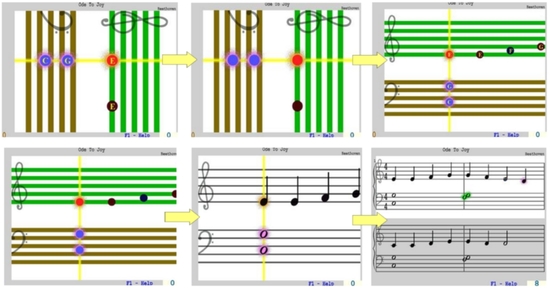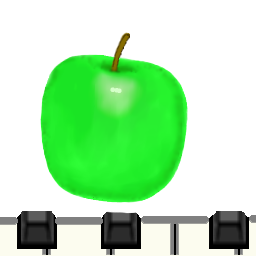Preparatory A (from 2+). Lesson 7

Your FREE Demo version is here
Your full version access is here
What motivates us to do anything? How to keep motivation and always be happy and excited to learn music and piano?
Here is what my thoughts are about it:
1. Your vision - the ability to see every note and key on the fly is the most powerful tool for motivation to learn how to play piano and read music.
You may ask your baby to push a button and pull a tune from an iPod - you may ask your baby to sit and perform any simple tune by oneself at the piano keys. The quality of the performance is probably very different and most likely not in your baby's favor.
But the quality of the IMPACT on YOUR child's mind will be much stronger if he will make the music and interpret it by himself. It is easy to do with our adjustable notation:
You as a parent will be able to choose the visual format that works the best for your child's eyes. It will be natural for you to gradually challenge by changing it for more complicated visual modes as your child progresses.
Most importantly, by MAKING music by himself his own body, heart and soul, he is participating in a process of changing his own life and fate.
He receives a very important message from his own subconscious: he is a master of his own life even when he is playing by notes written by another creator.
For children this is one of the most important lessons of their lives. It is no accident that Plato named music education the foundation of general study, and making music should be placed in front of all of the other subjects.
2. Surrounding.
Russians have a saying that a really educated person ought to have at least 3 diplomas: his, his parents and his grandparents.
Suggest to create a “cult of music education” in your/your students' homes. Do not be intimidated by the word “cult.” After the global pull back from music education, when music is gradually being squeezed out of public schools and pianos are given away for free to be replaced by pieces of furniture, it is time to swing the pendulum the other way.
Without a piano or even a digital keyboard, a home has no soul. This instrument has to have the most comfortable place in the house, accessible to all family members. This instrument should never collect any dust on it. If someone goes to play it, with or without headphones, everyone else should respect this creative act and never prevent it from happening.
3. Social communication.
Be encouraged to find “brothers in music making.” Carefully look around in your child’s day-care center or school. Are there any other parents who understand the importance of music education and whose child is taking piano classes?
Ask them: 'Do you enjoy meeting people?' Suggest to initiate some meetings – evenings – parties, where children and adults will play music pieces for each other.
Make it a tradition! Communicate, have fun, eat delicious food, let kids communicate with each other, too. Why don’t we add more flavor and meaning to your parties?
Such meetings can change the quality of your communication not just with other adults, but also with children – big time!
Start with a little recital. When your little “pumpkins” and you play music pieces prepared especially for the event, the bond between generations will become much stronger.
4. Virtual communication.
Internet communities. Interactive communication can also be a huge incentive for taking music lessons. We founded the Soft Mozart community (a forum and network) for people who want to receive a good effective music education.
Our experience proved to us how important is it to be heard and to have the ability to communicate while receiving a music education.
Even little children love to play for their peers from different countries as well as listen to their friends’ performances. They like to hear the pieces that they are learning as well as new ones. After that they suddenly say to their parents: “I am going to learn this song, too!”
5. Join our Soft Mozart community and share your You Tube videos. We developed our Academy with the goal of giving music educators not only an opportunity to communicate directly, but also to give a chance to get inspired by other learners and/or their parents.
By being in touch with people who care about music education and who wants the best for their children and themselves, our community members receive positive reinforcement and strengthen their own motivation.
We send each participant a Certificate of participation and special gifts to build the strong motivation to learn how to play piano and read music.
Our students and teachers are with us for years. The community is very knowledgeable and unique.
You will be amazed, how much your motivation to learn music and piano with us will grow over time. Just step in and say Hello!
...
Keep working on 5 fingers exercise. Ask your child to play 5 keys beginning from Do using different fingers. Let us know, how it went! We will help you, if you have any problems!
....

1. Keep practicing the  Guess Key® Module for 30 sec - 1 min. Keep writing the score down and watching the progress of your child.
Guess Key® Module for 30 sec - 1 min. Keep writing the score down and watching the progress of your child.
2. Place cards from Do to Do and Re to Re in forward and backward orders.
....

 Gentle Piano®
Gentle Piano®
1. Keep teaching your child to play Right hand of 'Hot Cross Buns'. You may give him/her to play the entire piece without cutting segments. Sing the melody with Solfeggio syllables Do Re Mi
Activity for the FULL version users:
2. ![]() Download and save NEW PIECE called Butterfly from this link and add it to your 0 Album. Teach your child to keep pressing each of the 4 keys before they see butterflies. Encourage your child to use different fingers beginning from thumb.
Download and save NEW PIECE called Butterfly from this link and add it to your 0 Album. Teach your child to keep pressing each of the 4 keys before they see butterflies. Encourage your child to use different fingers beginning from thumb.
....
1. Let your child play at least Left hand of the 'Surprise Symphony' and the 'Slumber Song'
....
Sincerely yours,
Hellene Hiner
Video success:
PS
All the lesson plans:
for 24 months to 3 year old
3 year old to 5 year old
5+ year old
Intensive Course for Adults-beginners
Always check here, if there any recital in the progress! You and your child will benefit a lot from the participation.
Your place to start your Diary is here
